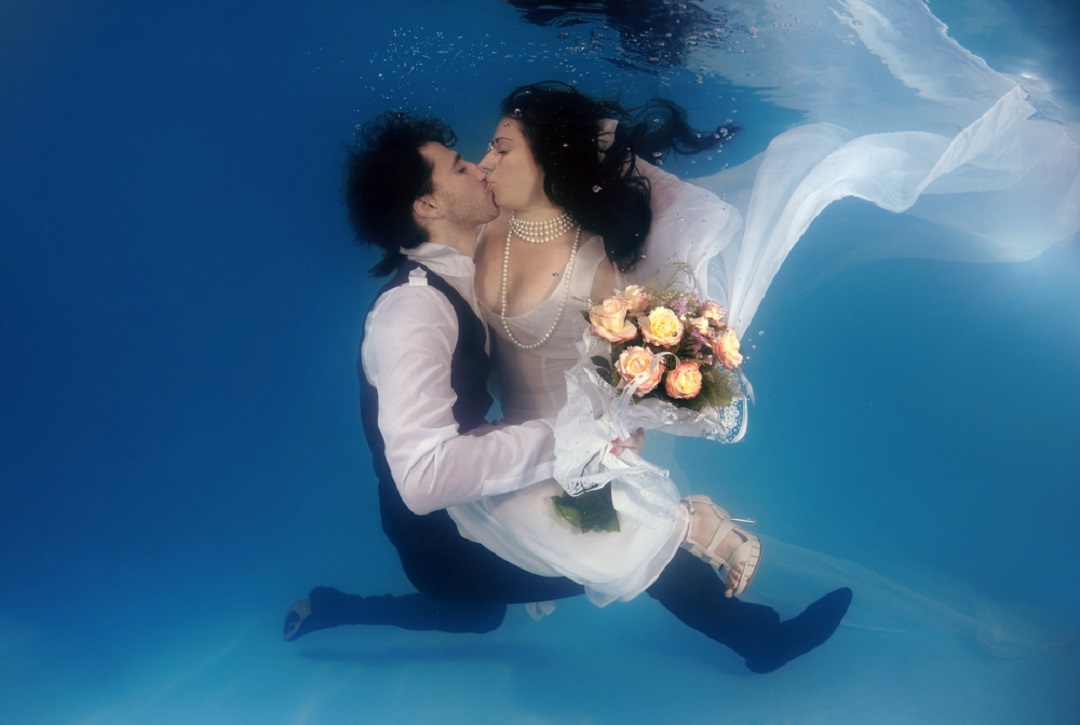- Expert advice/
- Wedding planning 101/
- Legal/
- Hawaii Marriage License—The Laws to Get Married on The Island
- Legal
Hawaii Marriage License—The Laws to Get Married on The Island
If you’ll be getting married in Hawaii, be sure to familiarize yourself with Hawaii’s marriage laws. Everything you need to know is right here.
Last updated February 5, 2024

The First Look ✨
- If you’re planning to get married in Hawaii, it’s important to read up on the state marriage laws to be sure you and your partner meet all of the local requirements to make your nuptials official.
- Hawaii offers traditional marriage licenses. Applicants need to pay a $60 fee in order to obtain one.
- Marriage licenses may be applied for online, but couples will need to appear in person at an appointment made with one of Hawaii’s marriage license agents.
- There are no residency restrictions in the state of Hawaii. Couples who reside in another state may hold a ceremony in this state with no legal limitations.
You’re getting married in Hawaii, which is already a wedding dream come true. From stunning seascapes, to majestic volcanoes, to vibrantly colored gardens, this state is bursting with a special kind of wedding day magic that’s hard to find anywhere else.
Along with the big island’s unique landscape and charm, Hawaii has a distinctive set of marriage laws that couples should be aware of as they approach their special day. Haven’t got a clue where to begin when it comes to legal matters? No problem. This post will lei (we couldn’t help ourselves) out the specifics of the local statutes so that you can stress less and sip on your tiny umbrella drink in the weeks leading up to your dream wedding.
Marriage Laws and Requirements in Hawaii
In regards to marriage, every state does things a bit differently. When you boil it all down, love is right smack dab at the center of it all. But that doesn’t mean you shouldn’t try to channel your inner Elle Woods when it comes to understanding the legal requirements (vital records, registration system, and more) of making things official.
Here are a few terms you’ll want to get familiar with when preparing to get a marriage:
-
Marriage License: Ah yes, the piece of paper standing between you, your spouse-to-be, and a legally binding union. A Hawaii marriage licenses—not to be confused with marriage certificates—are a must if you want your vows to count for anything more than a beautifully tearful exchange of intention and commitment. Each state has different protocols when it comes to this matter, so be sure you’ve done the research relevant to your ceremony and your place of residence. (Hint: If you’re getting married in Hawaii, you’ve come to the right place.)
-
Civil Union License: The primary difference between a marriage and civil union license is that that latter only provides legal protections at the state level. It’s important to emphasize that a civil union isn’t a marriage, therefore it doesn’t provide federal protections, benefits, or responsibilities to couples and may not be recognized by all states. That said, you can still acquire a civil union license in Hawaii and even fill out an online application in the registration system.
-
Marriage License Fees: Everything comes at a cost, and marriage licenses are no different. Don’t worry—you shouldn’t have to rearrange your entire wedding budget, but you should be prepared to pay some sort of fee in exchange for your marriage license. The exact amount will depend on the state in which you’re applying. Some fees are as low as $10, while others are as much as $115. The accepted methods of payments vary by state as well. If you hardly ever carry cash or a checkbook, it’s best to call ahead to confirm whether or not the fee is payable by card.
-
Waiting Periods: Some states require couples to wait for a certain amount of time before issuing their marriage license. While spontaneous marriages are certainly romantic, some states are understandably wary of them and require couples to put on the brakes for a few days after receiving their marriage licenses just to be sure they’ve had time to think things over.
-
Blood Tests: Premarital blood tests are mostly a thing of the past, but it’s something you may still be subject to depending on the state in which you plan to be wed. This kind of testing got its start in the 1930s when public health concerns about the spread of syphilis were on the rise. Other diseases on the radar at the time included HIV, tuberculosis, and rubella. Most states decided to scrap these laws as the cost of testing grew higher than the threat of disease, but the state of Montana still enforces this procedure.
-
Residency Requirements: Most states in the United States have open border policies, welcoming couples from all over the country to celebrate their special day in the locale of their choice. However, some marriage license application procedures will differ for non-residents.
-
Witnesses: Another detail to consider when planning your big day is your state’s laws surrounding ceremony witnesses. For several states, two witnesses are required—not only to be present for the exchange of vows, but also to sign the marriage license after the ceremony takes place. So, if you’re planning a private elopement, double check to see if you’ll need witnesses in addition to the officiant.
-
Legal Age of Marriage: For most states, the legal age of marriage is 18 years old. At this age, individuals have reached the age of consent and are free to marry without the need to obtain permission from a parent or guardian. This holds true across the country—with the exception of Nebraska, which requires a minimum age of 19 years old to marry without parental consent. Otherwise, any individual under the age of 18 will need to provide consent from a parent/guardian. Check your local state laws for more information about the minimum age requirements to marry without parental consent.
-
Officiant Qualifications: You know that marriage licenses are the what when it comes to making it official, but what about the who? Specific details about who is recognized as a legal officiant vary from state to state. Civil ceremonies, in particular, may run into more legal obstacles than ceremonies with a religious affiliation. So, if an old friend becomes ordained as a justice of the peace just for you and your spouse-to-be, you may want to confirm that the state in which you’re set to get married allows it.
How do Hawaii’s state laws shape these requirements and the process of applying for a marriage license? Read on for the state-specific details.
Hawaii’s Marriage License Application Process
The marriage license application in Hawaii is pretty pain-free as long as it is precisely that—in Hawaii. (More on that soon.) But first, start by picking a dreamy wedding venue along Hawaii’s lush coastline, pair it with Zola’s Wedding Vendors search to find an array of pre-screened vendors in the area, and then meet us back here for licensing specifics.
Ready? Let’s dive into the ins and outs of Hawaii’s marriage application process.
Types of Licenses Available
In addition to traditional marriage licenses, some states offer licenses for individuals participating in a covenant marriage. Covenant marriages require premarital counseling, and the spouses-to-be enter into the union with the understanding that divorces will only be granted under certain circumstances deemed valid by the laws of the state.
In Hawaii, covenant marriages are not an option. Instead, couples will have to apply for a traditional marriage license through the State Department of Health.
Documents Required
Couples holding their ceremonies in Hawaii need to present a few important documents in order to be granted a marriage license.
Important: Non-residents need to apply for a marriage license in Hawaii, not in the state they reside in.
-
Both residents and non-residents must fill out an application online.
-
Both parties must attend an appointment with a local marriage license agent in person in order to receive their marriage license.
-
Documentation of death or divorce must be provided by individuals who have been widowed or divorced within 30 days of applying for a new marriage license.
-
The couple must meet the state age requirements and present a valid ID as proof of their age. Examples of valid forms of identification include:
-
Passport
-
Driver’s license
-
Military ID
-
Birth certificate
Note: According to Hawaii state laws, individuals 19 years of age or older may provide any one of the above forms of ID. Individuals 18 years old or younger, however, must present a birth certificate.
Fees
Hawaii requires a fee of $60 (plus a $5 administrative fee) in order for marriage licenses to be processed. It may be paid online or in person.
Waiting Period
There is no mandatory waiting period in the state of Hawaii. Couples who have been granted a marriage license are eligible to be married as soon as the license has been issued.
Expiration of License
Marriage licenses in Hawaii are valid for 30 days. If not used within 30 days, the marriage license will be considered null and void, and couples will need to reapply.
Registering the Marriage License
After the wedding ceremony, your officiant will handle the details regarding the registration of your marriage license within the state. Upon registering the signed license, couples can expect to receive their marriage certificate within four to six weeks after the date of your ceremony. The marriage will then be legally recognized across all states.
You’re almost ready to apply! Read over the special considerations in the next section to be sure you meet all of the specific requirements for the state of Hawaii.
Special Marriage Considerations in Hawaii
Before you get started with step one of applying for a marriage license in Hawaii, make sure you and your partner are eligible and prepared for marriage according to the considerations below.
-
Age Requirements: Without parental consent, Hawaii imposes a minimum age of 18 years old in order to get married. With parental consent, individuals as young as 15 years of age are able to apply for a marriage license. At 15, individuals need written consent from parents or guardians and a judge. For those between 16 and 17 years old, only parental consent is required.
-
Officiant Registration: Officiants, commonly known in this state as marriage performers, must be licensed by the state of Hawaii. Performers wishing to conduct a ceremony must register and be approved by the State Department of Health. If the officiant you had in mind is from out of state, be sure to factor this registration period into the overall wedding planning timeline.
-
Copies of the Marriage Certificate: Copies of your marriage certificate will be needed for a number of things, such as insurance and bank accounts. Couples may request certified copies of their marriage certificate online and should expect to pay $10 for the first copy and $4 for each additional copy after that.
Plan Your Hawaii Wedding With Zola
You’re a lean, mean wedding planning machine. But no one can be expected to master marriage legal matters and keep track of every design detail before the big day. That’s where Zola comes in.
We can help you:
-
Build a wedding website that’s as elegant as it is informational.
-
Connect with local photographers, videographers, florists, and caterers on Hawaii’s islands. (Bonus: They’ve all been pre-screened and primed for our wedding Vendor Search.)
-
Create a registry that offers free returns and shipping.
Curious to know if we can help out with something that’s not on the list? Just ask the experts at Zola. We love love, and we can’t wait to lend a hand in the process of celebrating yours.
Start planning your dream Hawaii (or Kauai, Honolulu, Maui, Oahu...) wedding with today.
Up next for you

Most Popular Types of Wedding Venues
Venues
Finding the perfect wedding venue can be a challenge. We outlined a few popular types of wedding venues to help you find one that's right for you.

34 Best Honeymoon Destinations for 2024
List
Plan your ideal honeymoon with our curated destinations list. From breathtaking beaches to charming cities, discover the perfect romantic escape.

Extreme Wedding Venues: Underwater
How To
An underwater wedding may seem like the perfect “something blue” for adventurous couples, but the logistics of these under-the-sea ceremonies can be more involved than you may think. Here’s everything you need to know when planning for your underwater nuptials.

How to Propose on Vacation
How-To
Proposing on vacation is many people’s dream, but when you are so far from home, the stakes are higher. Read on for more about vacation proposal ideas
Featured

Destination Wedding Website: Help Your Guests Prepare For Your Wedding
How-To
If you’re having a destination wedding, it’s crucial to create a wedding website that lays out all of the details. Read on to learn what to include.

The Ultimate Destination Wedding Checklist for Couples
How-To
This destination wedding checklist is the #1 resource you’ll need to plan your exotic celebration. Discover how to choose a destination wedding location, what to look for in a wedding venue, how to work with local vendors, and more.

How to Choose The Best Wedding Month
Getting Started
Choosing your wedding month and date is a crucial first step in the wedding planning process. Here's how to decide on the best time of the year to get married.

Do You Need a Wedding Guest Book?
Advice
Guest books are traditionally part of every wedding. But through your planning, you may wonder if you really need one? Read on to get this answer and more.
- Expert advice/
- Wedding planning 101/
- Legal/
- Hawaii Marriage License—The Laws to Get Married on The Island
Find even more wedding ideas, inspo, tips, and tricks
We’ve got wedding planning advice on everything from save the dates to wedding cakes.
